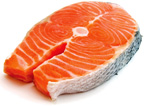You Are What You Eat
The Nutritional Component of Anti-Aging
By Dr. Ronald Klatz and Dr. Robert Goldman
As we age, we want to maintain the same quality of life we enjoyed in our younger years. The everyday food choices we make can have lifelong implications. For example, dietary factors account for about 30 percent of all cancers in Western countries. As research continues to show, a nutritional anti-aging regimen can help keep you active and healthy for life.
Let's look at the latest clinical studies demonstrating the main components of an ideal anti-aging diet.
Go Fish
 Certain types of fish are high in essential fatty acids, which helps to lower cholesterol and prevent the aggregation of blood platelets on artery walls. These omega-3 fats also have been shown to elevate a blue mood. Mackerel and salmon (wild, not farm-raised) are good fish choices. A study by University of Agder (Norway) researchers suggests a diet featuring fish can "promote population health, as well as help preserve cultural diversity in eating habits and contribute to more environmentally friendly eating."
Certain types of fish are high in essential fatty acids, which helps to lower cholesterol and prevent the aggregation of blood platelets on artery walls. These omega-3 fats also have been shown to elevate a blue mood. Mackerel and salmon (wild, not farm-raised) are good fish choices. A study by University of Agder (Norway) researchers suggests a diet featuring fish can "promote population health, as well as help preserve cultural diversity in eating habits and contribute to more environmentally friendly eating."
Note: Some fish should be avoided due to high levels of the potential cancer-causing agent methylmercury. Salmon is especially low in methylmercury, as are flounder, cod and haddock, which also are great sources of low-fat protein and high in B vitamins. Trout, tuna and halibut are rich in omega-3s, iron and magnesium, but fairly high in methylmercury, so limit your consumption of these fish. It's best to totally avoid swordfish and shark, which are extremely high in methylmercury.
Antioxidants: Your Best Weapon Against Cancer
 Residents of the Okinawan prefecture in Japan have an average life expectancy of 82 years, among the longest in the world. The area's residents also commonly suffer little or no age-related disability. Noting that Okinawa is a distinct area characterized by unique traditional food habits, Kyoto University (Japan) researchers have found that food items typical in the Okinawan diet possess higher cancer-preventive potential than those common in Japan (and the rest of the world). Specifically, locally grown sugar cane and curcumin (tumeric) were identified to contain high antioxidant activity.
Residents of the Okinawan prefecture in Japan have an average life expectancy of 82 years, among the longest in the world. The area's residents also commonly suffer little or no age-related disability. Noting that Okinawa is a distinct area characterized by unique traditional food habits, Kyoto University (Japan) researchers have found that food items typical in the Okinawan diet possess higher cancer-preventive potential than those common in Japan (and the rest of the world). Specifically, locally grown sugar cane and curcumin (tumeric) were identified to contain high antioxidant activity.

